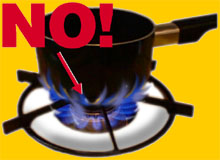
EnviroWatch
Wise Energy Use
 Sensible Energy Use really means getting the most energy for your money. This section of Energy Underground highlights a few guidelines for making your energy dollars work harder.
Sensible Energy Use really means getting the most energy for your money. This section of Energy Underground highlights a few guidelines for making your energy dollars work harder.
Kitchen Clues
Sensible Energy Use
 Around the home you could go room by room in your house, trailer or apartment and find many ways to use the energy of natural gas more economically. Here are just a few kitchen clues:
Around the home you could go room by room in your house, trailer or apartment and find many ways to use the energy of natural gas more economically. Here are just a few kitchen clues:
- A clean stove cooks more efficiently. Clean spills when they happen to keep burners and racks free of burned foods.
- Flames should never “reach” up the sides of the pot you’re using. Make sure the flame fits the pot. This saves gas and helps prevent accidents.
- Plan ahead when using the oven. Can two dishes be cooked at the same time? Can you resist peeking at your culinary creations? Opening the oven door too often might prolong the cooking time – every peek loses heat!
- Defrost foods before you put them in the oven.
- Preheating your gas oven before cooking usually is not necessary; check the recipe.
Laundry Lessons
Hang when you can
 Your gas laundry appliances will be very efficient if used correctly. For instance, get the most from your washer or dryer by working with full loads and the right detergent. Is the dryer vented to the outside to prevent too much moisture in the laundry room?
Your gas laundry appliances will be very efficient if used correctly. For instance, get the most from your washer or dryer by working with full loads and the right detergent. Is the dryer vented to the outside to prevent too much moisture in the laundry room?
Experiment with your gym clothes: Do they come out just as clean using warm or cool water? Saving the HOT water for special laundry challenges saves energy bucks too.
When possible, hang your clothes to dry instead of putting them in the dryer. This will save energy and can make your garments last longer.
Bathroom Hints:
A Quick Clean
 Quick 5-8 minute showers use less hot water than baths, which saves energy and money. Fill a cup with hot water before you shave rather than letting the water run the entire time you’re shaving. Day after day and shave after shave, the energy and money savings will really add up!
Quick 5-8 minute showers use less hot water than baths, which saves energy and money. Fill a cup with hot water before you shave rather than letting the water run the entire time you’re shaving. Day after day and shave after shave, the energy and money savings will really add up!
When brushing your teeth, only run the water to rinse. Don’t leave the water on the whole time you’re brushing.
All Around the Home
 Check your hot water heater’s setting. If your family has an automatic dishwasher, the proper setting is 140 degrees; otherwise, 120 degrees is recommended. To maintain it, once a year, drain off a gallon or two from your hot water heater, using the valve near the bottom to facilitate doing this. Any sediments or deposits in your water can be drained off and your water heater will be able to perform more efficiently.
Check your hot water heater’s setting. If your family has an automatic dishwasher, the proper setting is 140 degrees; otherwise, 120 degrees is recommended. To maintain it, once a year, drain off a gallon or two from your hot water heater, using the valve near the bottom to facilitate doing this. Any sediments or deposits in your water can be drained off and your water heater will be able to perform more efficiently.
Insulation in your home is important too. A poorly insulated home makes your heater and air conditioner work harder, which wastes energy and money and can shorten the lifespans of the units. With insulation in the ceiling or under the floor, heated or cooled air stays in the home, rather than drifting through under-insulated spaces or cracks. Also, windows and doors should be checked to see that caulking and weather-stripping are in place.
Even curtains or blinds can be called upon to save energy. Close curtains to block out unwanted heat from strong sunlight or open them to let in the winter’s warming rays.
Sensible Energy Use
 Other quick sensible energy use tips include: Experts say that you should change your gas furnace filter 2 or 3 times a year.
Other quick sensible energy use tips include: Experts say that you should change your gas furnace filter 2 or 3 times a year.
Fireplace flues should remain closed when not in use.
Keep your gas grill clean; the food will taste better and the gas burners will burn more efficiently.
Check your thermostat settings, especially in winter: for sensible energy use, try lowering the temperature and putting on a sweater in the winter. If you’re going to be away for awhile, energy experts suggest setting the thermostat at 55-60 degrees, plenty warm enough to keep the pipes from freezing or killing your pet Venus flytrap!
To save energy in winter, put on a sweater or other warm clothing before you reach for that thermostat!
